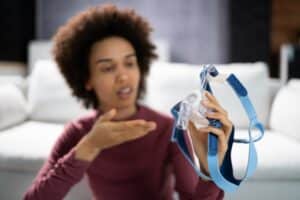Why Some People Can’t Tolerate CPAP — and What to Do Instead
 For many people diagnosed with sleep apnea, a continuous positive airway pressure (CPAP) machine is the first treatment recommendation. However, the noise, discomfort, and nightly maintenance often make CPAP therapy hard to stick with. If you or someone you love struggles with CPAP intolerance, you’re not alone. Fortunately, there are other options for achieving restful, uninterrupted sleep without relying on a bulky machine.
For many people diagnosed with sleep apnea, a continuous positive airway pressure (CPAP) machine is the first treatment recommendation. However, the noise, discomfort, and nightly maintenance often make CPAP therapy hard to stick with. If you or someone you love struggles with CPAP intolerance, you’re not alone. Fortunately, there are other options for achieving restful, uninterrupted sleep without relying on a bulky machine.
At eos dental sleep in Philadelphia, Dr. Marc Levin specializes in customized CPAP alternatives through oral appliance therapy. A graduate of the University of Pennsylvania School of Dental Medicine, Dr. Levin has advanced training in dental sleep medicine and is a member of the American Academy of Dental Sleep Medicine. His experience enables him to design FDA-approved dental appliances that help patients sleep comfortably, reducing snoring and sleep apnea symptoms.
Why CPAP Isn’t Always the Right Fit
While CPAP machines can be effective, many patients struggle with side effects that interfere with daily life. Some common reasons patients abandon CPAP therapy include:
- Discomfort from the mask: Wearing a mask all night can cause skin irritation and pressure marks.
- Noise and disruption: The sound of the machine can make it difficult for both the patient and their partner to sleep.
- Claustrophobia: Many people feel confined or anxious when using a CPAP mask.
- Dryness or congestion: Airflow can cause dryness in the mouth or nose, making it harder to rest comfortably.
When these challenges make CPAP use unsustainable, oral appliance therapy becomes an appealing and effective alternative for better sleep.
How Oral Appliance Therapy Helps You Sleep Better
Oral appliance therapy uses a small, custom-made mouthpiece to gently reposition the jaw and tongue during sleep. This keeps the airway open, preventing the blockages that cause snoring and sleep apnea. Patients often find this treatment more comfortable and convenient than CPAP.
The benefits of oral appliance therapy include:
- Quiet nights: No machine noise or air hoses.
- Comfortable fit: Appliances are customized to each patient for ease of use.
- Portable design: Perfect for travel and everyday use.
- Easy maintenance: Simple to clean and store.
According to the American Academy of Sleep Medicine, oral appliances are a clinically proven treatment for mild to moderate sleep apnea and can significantly reduce snoring and apnea events. Many patients notice improvements in their sleep quality within the first few nights of use.
Sleep Peacefully with Dr. Marc Levin
If you’ve tried CPAP without success, it’s time to discover a more comfortable alternative. Contact eos dental sleep in Philadelphia, PA, to learn how oral appliance therapy can help you breathe easier and sleep soundly. Call (215) 241-0700 to schedule your consultation today.
